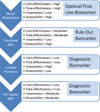Blood-based biomarkers in Alzheimer disease: Current state of the science and a novel collaborative paradigm for advancing from discovery to clinic
- PMID: 27870940
- PMCID: PMC5218961
- DOI: 10.1016/j.jalz.2016.09.014
Blood-based biomarkers in Alzheimer disease: Current state of the science and a novel collaborative paradigm for advancing from discovery to clinic
Abstract
The last decade has seen a substantial increase in research focused on the identification of blood-based biomarkers that have utility in Alzheimer's disease (AD). Blood-based biomarkers have significant advantages of being time- and cost-efficient as well as reduced invasiveness and increased patient acceptance. Despite these advantages and increased research efforts, the field has been hampered by lack of reproducibility and an unclear path for moving basic discovery toward clinical utilization. Here we reviewed the recent literature on blood-based biomarkers in AD to provide a current state of the art. In addition, a collaborative model is proposed that leverages academic and industry strengths to facilitate the field in moving past discovery only work and toward clinical use. Key resources are provided. This new public-private partnership model is intended to circumvent the traditional handoff model and provide a clear and useful paradigm for the advancement of biomarker science in AD and other neurodegenerative diseases.
Keywords: Alzheimer's disease; Biomarker; Blood; Cerebrospinal fluid; Context of use; Diagnosis; Imaging.
Copyright © 2016 the Alzheimer's Association. Published by Elsevier Inc. All rights reserved.
Figures




References
-
- Lista S, F F, Prvulovic D, Hampel H. Blood and plasma-based proteomic biomarker research in Alzheimer's disease. Prog Neurobiol. 2013;101–102:1–17. - PubMed
Publication types
MeSH terms
Substances
Grants and funding
LinkOut - more resources
Full Text Sources
Other Literature Sources
Medical
Miscellaneous

